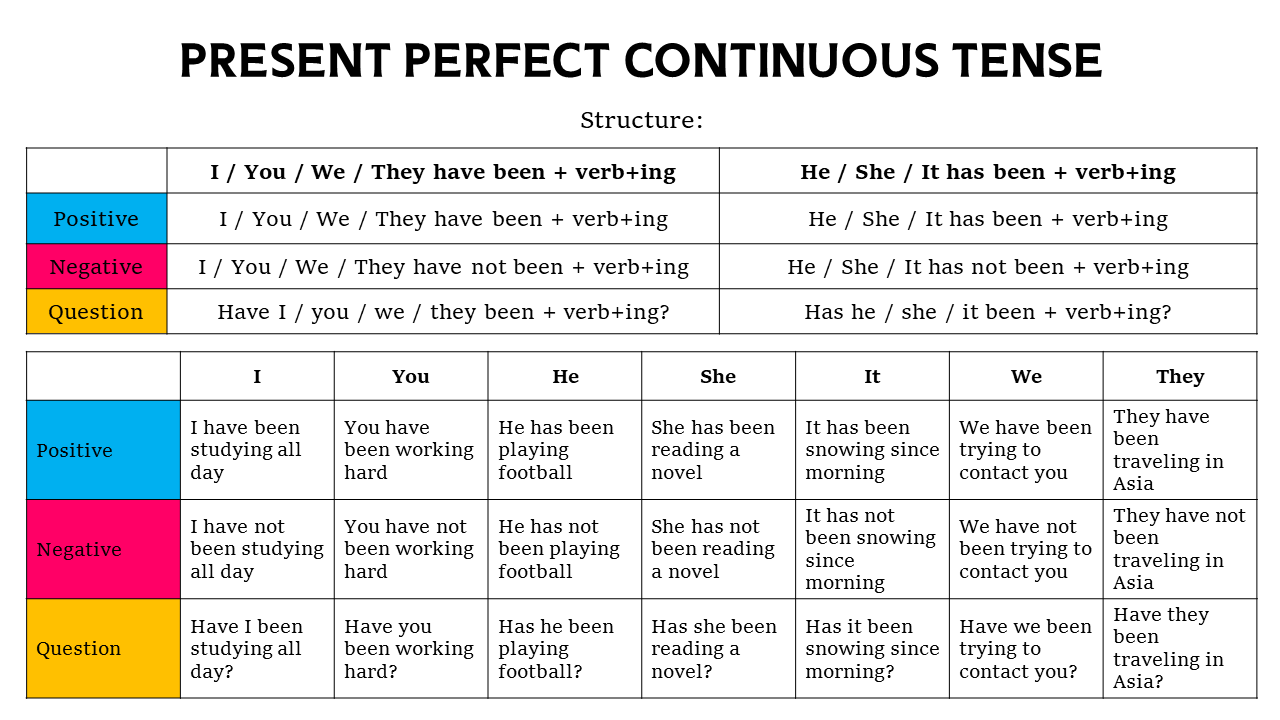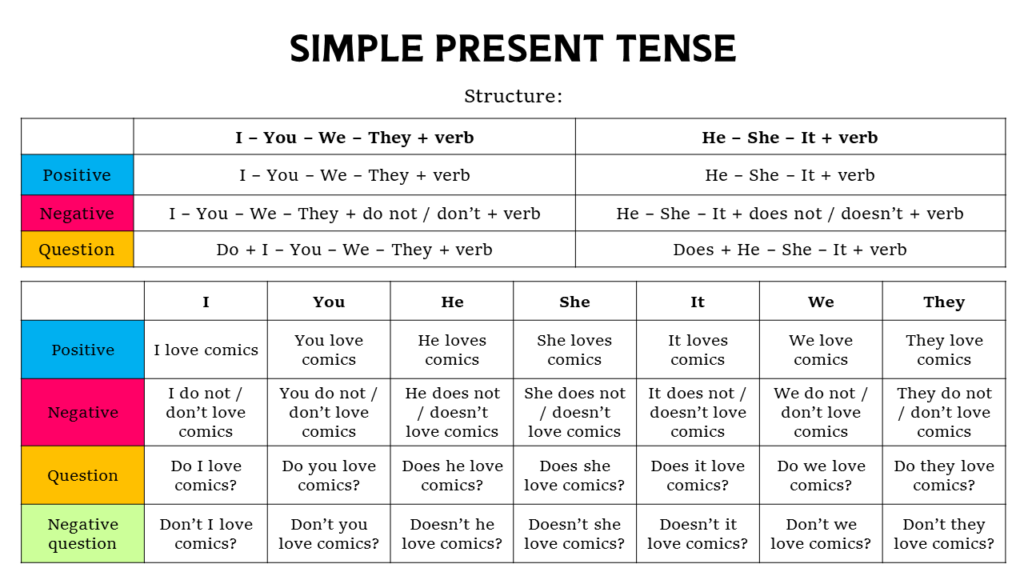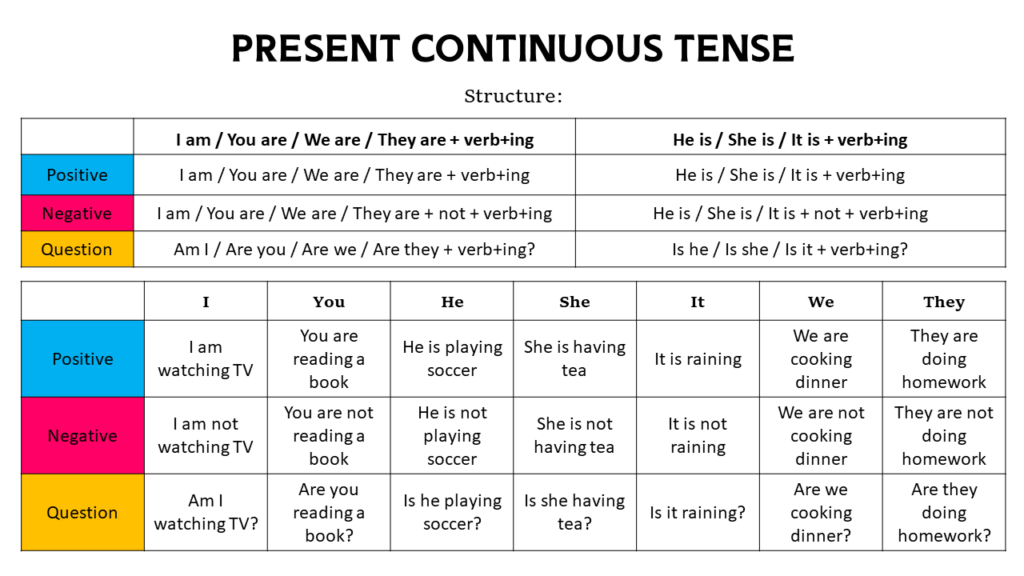Diving into the nuances of the English language, the present perfect continuous tense offers a unique way to express actions. It’s not just about what we’ve done, but how we’ve been actively engaging over time, blending the past and the present with a focus on the duration of activities.
Definition
The present perfect continuous tense articulates actions that began in the past and continue to the present, emphasizing the duration of the activity. It bridges the gap between past actions and their ongoing relevance or effect in the present.
Formula/Structure
This tense is constructed with the subject, followed by “have been” or “has been,” and the verb ending in -ing. Here’s a closer look:
- Affirmative: Subject + have/has been + verb(-ing)
- Example: “I have been reading this book for two hours.”
- Negative: Subject + have/has not been + verb(-ing)
- Example: “They have not been waiting long.”
- Interrogative: Have/Has + subject + been + verb(-ing)?
- Example: “Have you been working on that project?”
Rules with Examples
- Use ‘has been’ for third-person singular (he, she, it): “She has been studying all night.”
- ‘Have been’ is used with I, you, we, they: “We have been traveling since last week.”
- Emphasize the duration: “I have been living here for five years.”
How to Make Present Perfect Continuous Tense
1. Positive Present Perfect Continuous Tense
Express ongoing actions or processes that started in the past and continue into the present.
2. Negative Present Perfect Continuous Tense
Denote actions that have not been happening continuously or as expected.
3. Interrogative Present Perfect Continuous Tense
Pose questions about the duration or ongoing nature of actions.
Examples of Present Perfect Continuous Tense
Examples of Positive Present Perfect Continuous Tense
- “I have been studying for my exams diligently.”
- “They have been renovating their house for months.”
- “He has been working at the company for three years.”
- “We have been trying to reach you all day.”
- “She has been learning French since January.”
- “The children have been playing outside since lunchtime.”
- “It has been raining since this morning.”
- “I have been thinking about your proposal.”
- “You have been running every morning.”
- “The team has been preparing for the competition.”
Examples of Negative Present Perfect Continuous Tense
- “I haven’t been feeling well lately.”
- “She hasn’t been attending the meetings.”
- “We haven’t been getting good results.”
- “He hasn’t been taking care of himself.”
- “They haven’t been following the guidelines.”
- “The machine hasn’t been working properly.”
- “You haven’t been paying attention.”
- “The weather hasn’t been cooperating.”
- “I haven’t been sleeping well.”
- “We haven’t been communicating effectively.”
Examples of Interrogative Present Perfect Continuous Tense
- “Have you been waiting long?”
- “Has she been doing her homework?”
- “Have they been living here long?”
- “Has he been coping well with the changes?”
- “Have we been meeting our targets?”
- “Has it been snowing all day?”
- “Have you been exercising regularly?”
- “Has the project been progressing as planned?”
- “Have the plants been growing well?”
- “Has she been practicing her piano lessons?”

Exercise of Present Perfect Continuous Tense With Answers
Questions
- I (to work) on this project since January.
- She (not to sleep) well these days.
- How long (you to wait) for the bus?
- He (to learn) Spanish for two years.
- We (not to hear) from them recently.
- (they to cook) dinner for the past hour?
- The dog (to bark) since morning.
- You (not to take) your medication, have you?
- How long (she to use) that software?
- They (to plan) their vacation for weeks.
Answers
- I have been working on this project since January.
- She hasn’t been sleeping well these days.
- How long have you been waiting for the bus?
- He has been learning Spanish for two years.
- We haven’t been hearing from them recently.
- Have they been cooking dinner for the past hour?
- The dog has been barking since morning.
- You haven’t been taking your medication, have you?
- How long has she been using that software?
- They have been planning their vacation for weeks.
The present perfect continuous tense offers a rich way to express the ongoing nature and duration of actions, linking them intimately with the present moment. Mastering this tense enhances your ability to communicate complex temporal relationships and ongoing endeavors with clarity and precision.


